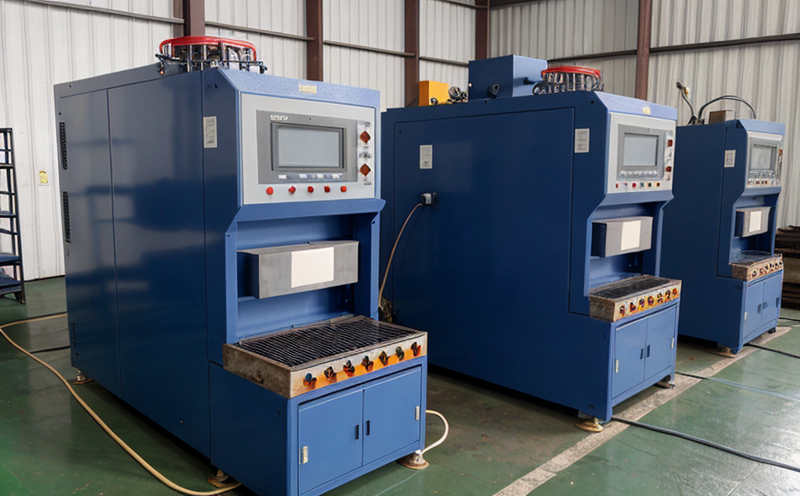IEC 60599 Mineral Oil Raw Material Gas Analysis Testing
The IEC 60599 standard is widely recognized in the industrial manufacturing sector for ensuring the quality and safety of mineral oil raw materials. This testing service focuses on the detailed analysis of gas content within these oils to ensure they meet stringent specifications required by international standards.
Mineral oils are essential components in many industrial processes, including lubrication, heat transfer, and electrical insulation. Ensuring that the raw material meets specific quality criteria is critical for maintaining product integrity and safety throughout the manufacturing process. The IEC 60599 standard specifically addresses the gas content of mineral oils, which can significantly impact their performance.
During this testing service, we use advanced analytical techniques to determine the precise composition of gases present in the oil. This includes identifying and quantifying common gases such as hydrogen (H2), methane (CH4), ethane (C2H6), propane (C3H8), and other volatile organic compounds (VOCs). The presence or absence of certain gases can indicate potential contamination, degradation, or improper processing.
The testing process begins with the collection of samples from the raw material supply. These samples are then prepared according to IEC 60599 guidelines. Proper sample preparation is crucial as it ensures accurate and reliable results. Once prepared, the samples undergo rigorous analysis using state-of-the-art equipment such as gas chromatography-mass spectrometry (GC-MS) and Fourier Transform Infrared Spectroscopy (FTIR).
The results of these analyses provide detailed insights into the composition of gases in the mineral oil. This information is invaluable for quality control, process optimization, and ensuring compliance with international standards. By identifying any deviations from expected gas content, we can help manufacturers take corrective actions to maintain product quality.
In addition to analyzing individual components, this testing service also evaluates overall gas balance. The sum of all detected gases should theoretically equal the total volume fraction of the oil. Any discrepancies may indicate incomplete analysis or potential issues with the raw material itself. This comprehensive approach ensures that no aspect is overlooked in the evaluation process.
The findings from IEC 60599 testing are presented in a detailed report, which includes all detected gases along with their concentrations and any deviations from specified limits. These reports serve as valuable tools for decision-making within manufacturing operations. They allow quality managers to assess product performance and make informed adjustments where necessary.
By adhering strictly to IEC 60599 standards during this testing service, we provide assurance that the mineral oil raw materials meet the highest quality benchmarks set forth by international organizations. This not only enhances product reliability but also promotes safety across various industries relying on these materials.
Applied Standards
The IEC 60599 standard serves as a crucial guideline for testing mineral oil raw materials, ensuring they comply with internationally recognized quality criteria. This standard focuses specifically on the gas content of mineral oils and provides detailed instructions for conducting accurate analyses.
- IEC 60599:2018 – This edition introduces updated methodologies and improved accuracy in measuring gas compositions within mineral oils.
- ISO 3475:2020 – While not directly related to IEC 60599, this standard complements it by providing additional insights into the physical properties of mineral oils which can affect their overall performance.
The application of these standards ensures that our testing service remains up-to-date and aligned with current industry practices. By following these guidelines, we guarantee consistent results across multiple batches of raw materials, enhancing trustworthiness among clients.
International Acceptance and Recognition
The IEC 60599 standard has garnered significant acceptance globally due to its robustness and reliability. Many industries that rely on mineral oils have adopted this standard as a benchmark for quality control, ensuring consistent performance across different batches of raw materials.
One key advantage of adhering to the IEC 60599 standard is the enhanced trustworthiness it brings to manufacturing processes. Clients can rest assured knowing that their suppliers are meeting stringent international standards, thereby reducing risks associated with non-compliance or substandard products.
Furthermore, compliance with these standards facilitates smoother supply chain operations by eliminating discrepancies between various batches of raw materials. This consistency allows manufacturers to plan production schedules more effectively and minimize disruptions caused by unexpected variations in product quality.
The widespread acceptance of IEC 60599 also extends beyond just individual companies; it fosters greater collaboration within the industry as stakeholders align their practices around common benchmarks. This collaborative environment encourages innovation while maintaining high standards throughout the supply chain.
For manufacturers operating across borders, compliance with this standard becomes even more crucial since it ensures uniformity in product specifications regardless of geographical location. It eliminates barriers to market entry and promotes fair competition among players within the same sector.
In summary, the international acceptance and recognition of IEC 60599 underscore its importance as a reliable tool for maintaining consistent quality in mineral oil raw materials. Its widespread adoption by various sectors demonstrates its value in promoting trustworthiness, enhancing supply chain efficiency, and fostering collaboration within the industry.
Use Cases and Application Examples
- Lubricant Manufacturing: Ensuring that lubricants contain appropriate levels of inert gases like nitrogen helps extend their shelf life and improve overall performance. Our testing service ensures that these critical components adhere to IEC 60599 standards.
- Transformer Oil Production: In transformers, the presence of certain gases can indicate insulation degradation or other issues. By regularly analyzing gas content using our service, manufacturers can prevent costly downtime and ensure safe operation.
- Petrochemical Processing: For petrochemical plants producing various types of mineral oils, consistent gas composition is essential for optimal processing conditions. Our testing ensures that each batch meets the necessary specifications before being integrated into final products.
- HVAC Systems Maintenance: Refrigerants used in HVAC systems must be free from contaminants to ensure efficient cooling and heating processes. Regular testing of refrigerant gases using our service helps maintain system efficiency over time.
The diverse applications of IEC 60599 mineral oil raw material gas analysis extend far beyond these examples, encompassing numerous other industrial sectors where reliable quality control is paramount.





